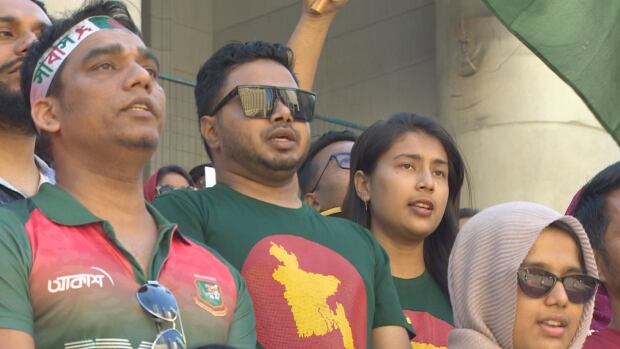
Bangladeshis in Vancouver react to PM's downfall after protests
CBC
Hope and excitement spread quickly among members of Vancouver's Bangladeshi community on Monday as news broke that the South Asian country's prime minister had resigned amid a mass uprising against her rule led mostly by students.
"We are celebrating our blood-shedded second independence of Bangladesh," said Abdullah-Al Talha, 31, who moved to Canada from his home country in 2006.
Members of the Bangladeshi diaspora took to Vancouver's streets, elated to see the nation's government topple after weeks of turmoil.
The news sparked an impromptu gathering Monday evening, organized by the Bangladesh Student Association Vancouver outside the Vancouver Art Gallery.
"I am literally getting goosebumps," added Talha, who attended the event clad in red and green, his home country's colours.
Prime minister Sheikh Hasina, who led Bangladesh for 15 years, faced increasing criticism after weeks of deadly unrest made her long-running "autocratic" leadership untenable, according to Parboti Roy, a sessional lecturer with the University of B.C.'s department of Asian studies.
"During [the government's] regime, they infringed on people's freedom of expression, and there was corruption," Roy told CBC News. "People were struggling with their everyday lives."
Last month, many frustrated students began to peacefully protest to end the quota system on government jobs, which they said mostly favoured families of veterans who fought in Bangladesh's war of independence in 1971.
Rumi Khan, an American analyst and columnist on Bangladeshi politics, told CBC the quotas were discriminatory.
"Bangladesh has serious issues of joblessness. There are hundreds of thousands to millions of students who have no job after graduation," said Khan, who is also a professor of medicine at the University of Texas, Austin.
Attempts to quell the demonstrations with force left hundreds injured and dead, which Khan says fuelled outrage against the government.
"The government tried to crack down on it, they overreacted, and they started killing students."
For the Bangladeshi community in Vancouver, the violent clashes made them fear for their families back home as they watched the situation play out from afar.
"It felt horrible, and it was very hard," said Khairul Hassan, a member of the Bangladesh Student Association Vancouver.





















 Run 3 Space | Play Space Running Game
Run 3 Space | Play Space Running Game Traffic Jam 3D | Online Racing Game
Traffic Jam 3D | Online Racing Game Duck Hunt | Play Old Classic Game
Duck Hunt | Play Old Classic Game











